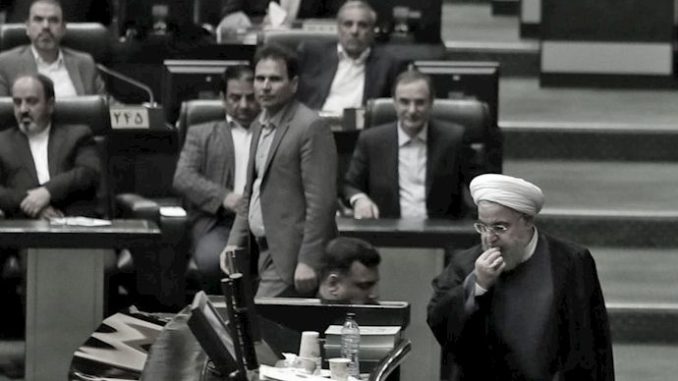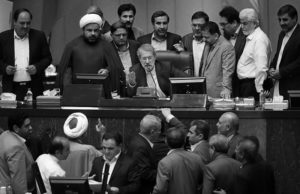
On Tuesday, August 28, the Iranian regime’s parliament summoned president Hassan Rouhani to answer questions before the parliament about the country’s economic crisis, and then voted to reject his explanations in a rare rebuke of a sitting leader.
But even before Rouhani’s appearance in the parliament, a question remained on the table of both ruling factions in Iran: What are the consequences of questioning him for the whole regime?
Iran Newspaper, the mouthpiece of Rouhani’s government, answered this question on 25 August and wrote: “Generally, it appears that the goal, or at least the certain outcome, of this questioning, isn’t to solve any troubles, but rather to increase the tensions and widen the gap in the power [circle] and this is more dangerous for Iran’s society than anything else.”
The main question on the table in Rouhani’s appearance before the parliament was the economic troubles the country is facing. He categorically denied government mismanagement and blamed United States sanctions as the root cause of the problems.
But after he made remarks on five questions about the economic crisis in Iran, such as the collapse of the value of national currency, the Rial, and the ever-increasing unemployment rates, a majority of lawmakers rebuked Rouhani’s explanations by a vote saying that they were “not convinced” by four of his five answers.

Despite Rouhani’s unambiguous support for the regime’s Supreme Leader, Ali Khamenei, a deeply rooted quarrel between his factions and Khamenei’s Revolutionary Guards was one of the first challenges that appeared on the parliament floor.
Iranian MP Mohammad Pourmokhtar said in the parliament’s August 26 session: “Questioning the statements by the armed forces commanders about international issues and responding to the foolishness of the ignorant American president is a duty to me. How is it that a bunch of ignorant and uneducated people accept that these commanders sacrifice their sweet lives for them, but don’t give them the right to make statements about it?”
In a counter attack, Rouhani’s faction instantly attacked Khamenei’s Guardian Council and the Revolutionary Guards.
Qasem Mirzaii Niku, a member of the regime’s parliament, said: “Discretionary control and a parallel government is choking [us all], and dirty money and dirty hands have corrupted the authorities. Corruption is like a seven-headed beast that appears somewhere every day.”
It is worth noting that the lawmakers’ rebuking Rouhani comes two days after the parliament dismissed the finance minister. Iran’s central bank chief and its minister of labor and social welfare have also been fired over the last few weeks.
The second consequence of the parliament’s August 26 session was widening of an internal rift inside Khamenei’s faction. Despite Khamenei’s support for Rouhani, they reiterated the government’s inefficiency and mismanagement.
(Source: PMOI/MEK)

